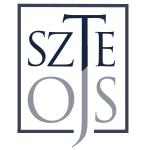A logika hétköznapi nyelvéről
DOI:
https://doi.org/10.14232/kulonbseg.2013.13.1.24Absztrakt
The paper investigates the question if formal logic is a valid tool for analysing everyday speech in Strawson, Quine, and Russell. Strawson accuses Russel of wanting to cleanse language of reference through logical analysis. In contrast to Russell, Strawson claims it is an illusion to think that formal logic is a valid tool for analysing everyday language and reference can be eliminated from it. Quine, similarly to Russell, considers logic the ideal analytical tool from which reference can be eliminated.
Yet both Strawson’s and Quine’s positions agree that everyday language use “has no logic.” One of them claims that this is why everyday language cannot be re-presented via logic, while the other maintains that is why everyday language has to be replaced by logic. Based on Russell, the paper argues that formal logic can indeed process referential expressions from everyday language use.






